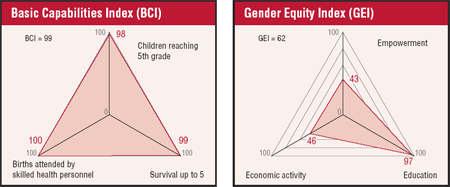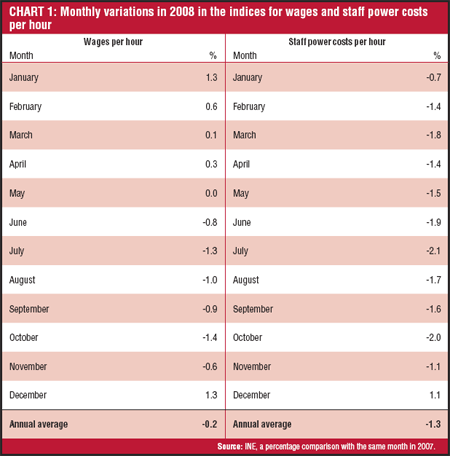The social impact of the crisis and the people's response
The social impact of the crisis and the people’s response
Centro de Estudios Nacionales de Desarrollo Alternativo (CENDA)
While recession and unemployment advance, pension funds are depleted and income drops, the Government puts pressure on wages in order to expand the economy. The unions and civil society propose other solutions: workers defend their wages, rights, funds and the right to decent work for all, and NGOs stress the need to build together an economy that prioritizes people and the planet.
 |
In 2009 Chile is being hard hit by the economic crisis, which started in mid 2007 due to the collapse of the sub-prime market in the United States and rapidly became global. The Chilean economy is extraordinarily open and therefore external phenomena can have major impacts. The fall in the international price of commodities, which began in 2008, has been felt acutely since the country’s economic and trade structure is heavily dependent on the export of a limited range of primary products with low added value.
For example, the price of a pound of copper reached its highest nominal level in July 2008 when it surpassed USD 4. By the end of the year it was averaging USD 1.40, although it recovered slightly in the first months of 2009. The drop in the price of copper affects, among other things, the rate of exchange, the terms of trade, the balance of payments and general economic activity, all of which in turn have negative social repercussions.
In the fourth quarter of 2008 the Chilean economy entered a recession. Economic activity declined dramatically, in step with similar worldwide tendencies and clearly highlighting the strong relationship between the national reality and the general trend of the crisis. During October–December the seasonally adjusted and annualized figures fell for the second consecutive quarter, when compared to the three preceding months. In the third quarter the reduction, according to National Accounts fell by 0.1%. In the fourth quarter, on the same basis, it is estimated to have contracted by 5%.
Industrial production declined over a period of 12 months; during the fourth quarter it fell by 3.6%, the largest drop since 1999. In December the annually adjusted figures showed an even steeper decline: 4.3%. In the fourth quarter, in comparison with the same period in 2007, total sales fell by 4%, while those on the internal market fell by 4.7%.1
Consumption and inflation
During the fourth quarter there was a considerable reduction in consumption, mostly caused by reduced spending by the poorer sections of the population, which continued to decline and reached 9% over 12 months. At the same time, the fall in the price of commodities led to the attenuation of one of the main social problems of 2008 – the high rate of inflation, which also mainly affected the poor. In October 2008 the annually adjusted rate of inflation reached 9.9%. This percentage was higher for the poorer two-fifths of the population due to a higher-than-average increase in the price of foodstuffs. As internal demand fell, inflationary pressure was reduced and, partly for this reason, the Consumer Price Index (CPI) began to fall in November and is expected to continue to do so during the year.
Another major reason for the drop in inflation is the reduction in the international price of oil, which is the country’s main import. On the other hand, due to the Government’s policy of stimulating investment in certain sectors at the expense of consumers, the price of electricity continues to be high. This is also the case for water rates and sanitation.
Unemployment
One of the major social costs of the recession is the increase in unemployment. According to the statistics of the Department of Economics at the University of Chile, unemployment in Greater Santiago (the capital and the metropolitan area) began to approach double figures for the three-month period from December to February, increasing two percentage points from 7.7% of the work force to 9.7%, despite the fact that seasonal employment increases in the summer. The recent official figure for national unemployment for the same quarter is 8.5%, which is 0.5 percentage points higher than the previous quarter.2
Pension funds
Another noticeable impact of the crisis is the fall in pension fund holdings, which are invested in Chilean and foreign financial assets. The collapse of financial markets during the crisis caused a considerable reduction in retirement savings, amounting to a loss of USD 27 billion, more than 26% of the total funds, by the end of 2008. A study by the Asian Development Bank analysing the events of 2008 lists Chile as the Latin American country in which household wealth suffered the greatest losses, due largely to the influence of the pension funds. Despite repeated protests from the people who have been affected, neither the private funds nor the Government have taken any action to compensate them.
Remuneration
Official policy to confront the contraction of the economy has been to lobby for the reduction of real wages – unfortunately with success. The concept of wage adjustment is based on the Government’s estimates of future inflation – as has been the practice during the governments of the “Concertación” (a coalition of political parties) since 1990 – and not on the loss in value of real wages. This has an adverse effect on workers’ incomes, and official attempts to apply this policy were met at the end of 2008 with mass protests organized by civil servants.
An assessment of the variations in the general index of wages per hour and the cost of staff power, prepared monthly by the National Statistics Institute, shows the consequences. Wages were negative as from June 2008, having experienced no changes during May, but lower than the second index, which considers wages from the employer’s perspective.
 |
To the reduction reflected in the wage charts one must add the reduction in credit that affects the general population, in particular the poorest, and small and medium-sized enterprises.
Non-governmental proposals
During this period of crisis, the Chilean Unitarian Workers’ Centre during this period of crisis has combined proposals for Un Chile Justo [A Fair Chile] into five main demands: (i) prevent using the crisis as an excuse to abandon workers’ rights; (ii) defend jobs; (iii) defend wages; (iv) defend pension funds affected by the crisis and ask for government intervention in the pension system; and (v) defend decent employment.
In a broader social and transnational context, ACCIÓN, the Chilean association of NGOs consisting of over 70 development organizations, has sent a letter to the world leaders that constitute the G-20 with four major proposals regarding the current world crisis:
a. Guarantee democratic governance of the economy, regulating financial activities, creating new fiscal instruments, creating barriers and restrictions to speculation, forbidding ‘casino’ financial products and ensuring that the resources from private and public savings are effectively routed towards productive activities. World leaders must insist on reforms regarding the governance of the World Bank and the International Monetary Fund (IMF) in order to make them more democratic, and ensure that all financial institutions, financial products and multinational enterprises operate with transparency and are publicly accountable for their activities. This should include the elimination of bank secrecy and tax havens, as well as the introduction of public control in all countries by means of international standards of accountancy.
b. Generate decent jobs and public services for all, guaranteeing massive investment in a “green new deal”, in order to create a green economy based on decent jobs and fair wages, investing in and strengthening the provision of essential public services, and working in favour of financing the development of all those countries that need it, without restrictive conditions attached.
c. Put an end to world poverty and inequality, dedicating 0.7% of national income to development by 2013, making these resources more effective and lobbying for the cancellation of all the illegitimate and unpayable debts of developing countries.
d. Build a green economy, pressing world leaders at the Copenhagen Climate Change Conference to agree to substantial and verifiable reductions of greenhouse gases and to undertake new and substantial transfers of resources from the North to the South in order to support the adaptation and sustainable development of poor countries. There is an urgent need to implement policies that set aside the liberalization and deregulation measures that characterized the 1990s. The letter calls on the governments of the G-20 as well as other countries to take advantage of this opportunity to begin to build an economy that places people and the planet in the forefront, in order to achieve a fairer and more equitable society.


